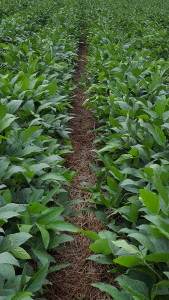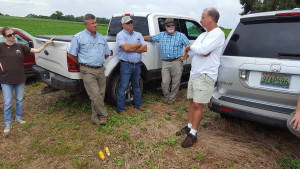
Brock uses rye and cover crop mixes to reduce erosion and retain soil moisture during extended dry periods. Soybeans are strip-tilled into rolled rye.
The Tri-State Row Crop Climate Learning Network was treated to a tour of several farms in the Monticello area, hosted by UF/IFAS Extension Jefferson County. The tour included a visit to the Brock Family Farm, where Kirk Brock utilizes a rotation of corn, peanuts, and soybeans. Kirk described the land he farms not as dryland, but rather “irrigated by God.” If my memory serves me correctly, Kirk mentioned farming 1000 acres divided among 87 separate fields. Cotton is noticeably absent from his crop rotation. Much of the land is rented from quail plantations that prohibit the planting of cotton on their farms.
Kirk makes every effort to get cover crops planted early to grow a high biomass rye cover crop in the winter, which he rolls down in late winter or spring before planting. After continued research (trial and error), Kirk opts for using a strip-till planter in corn and no-tills the peanuts in the previous corn row, without using an in-row subsoiler. Soybeans are planted the following year, again with a in-row ripper shank ahead of the planter. Recently he has moved to cover crop blends, looking to increase the nitrogen contribution from legumes. Kirk told the group that it is easier to build carbon through high biomass rye, but “organic matter is built from carbon and nitrogen both, and I am looking for sustainable methods to provide nitrogen to build organic matter.”
Kirk said that using these methods has tended to reduce the boom and bust of dryland farming on the gulf coast. Specifically, he hasn’t had the total crop failures associated with dryland farming that they had in the days of conventional tillage. This appears to Kirk to be a result of improved soil quality, increased water infiltration, and reduces evaporation, coupled with cooler soil temperatures. Kirk also lamented the winters he spent hauling topsoil back up the hill, to fill in ditches and gullies made during the rainy growing season. 
The Tri-State Climate Row Crop Learning Network is a community focused on strengthening information exchange and learning among farmers, Extension professionals and researchers. This is a dynamic network of climate champions, working to provide information, and develop cropping systems and recommendations for the challenging climate that is found in the Southeast US, especially along the Gulf Coast.
This video produced by SARE Outreach gives more information about the Brock Farm and the practices they use.
